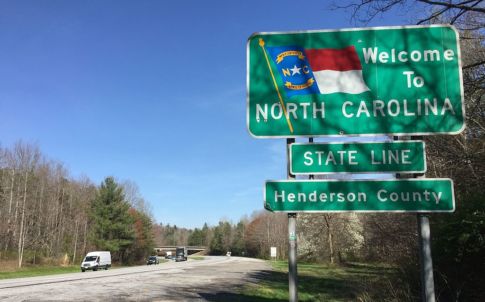Testimony of Stacey Carless, Executive Director of NC Counts Coalition

We are sharing the testimony of Stacey Carless, the Executive Director of the NC Counts Coalition, who is testifying before the House Committee on Oversight and Reform today on “Providing the Census Bureau with the time to produce a complete and accurate Census.” The PDF version of her testimony is here.
September 10, 2020
Chairwoman Maloney, Ranking Member Comer, and Members of the Committee: I am Stacey Carless, Executive Director of NC Counts Coalition. I want to thank you all for the opportunity to appear before you today to testify about the upcoming 2020 Census deadline. NC Counts Coalition is a nonprofit, 501(c)(3) organization established in 2017 to serve as a hub to facilitate cross-sector collaboration and coordination among government, planning, nonprofit and community organizations, service providers, businesses and others to achieve a complete and accurate Census count for North Carolina. The Coalition recognizes the Decennial Census as the most inclusive government operation in our country. Collectively, with our diverse membership of more than 250 national, statewide and community partners, we champion inclusiveness and strive for every individual in North Carolina to be counted. We believe that accurate Census data is essential to the economic well-being of North Carolina and the general well-being of every single North Carolinian.
NC Counts Coalition is the connective tissue for the state’s complete count commission, the U.S. Census Bureau and nonprofit and community-based organizations. Our knowledge, resources and capacity make us effective in convening stakeholders, coordinating plans and preventing duplicative efforts for 2020 Census outreach across the state. We invest in mobilizing and rely on research, data to build a robust field operation to support and complement the US Census Bureau’s 2020 Census operation. Additionally, we serve as a funding hub. To date, NC Counts Coalition has funded 60 community partners through a mini-grant program that allows partners to work on the ground and in the field, alongside Census Bureau staff, to move community members at risk of not being counted to participation in the 2020 Census. Our role as North Carolina’s hub for 2020 Census outreach keeps us on the ground and connected to North Carolina communities’ progress with 2020 Census operations, which positions us well to address the current deadline of the 2020 Census operation and its impact on North Carolina.
North Carolina is the ninth most populous state and the fourth fastest-growing state in the country. According to estimates from the U.S. Census Bureau, North Carolina’s population grew to 10.5 million people as of July 1, 2019. According to 2019 projection estimates, North Carolina is expected to pick up a 14th seat in the U.S. House of Representatives with a complete and accurate 2020 Census. Additionally, a complete and accurate 2020 Census count for North Carolina will ensure that our state receives its fair share of $1.5 trillion in federal dollars from Census derived programs; in 2017, North Carolina received $44 billion in Census guided funding.
As COVID-19 disrupts and takes over our lives, it is also disturbing the 2020 Census operation in North Carolina. About 3.8 million individuals who are predominantly Black, Brown, rural, and young children are missing from North Carolina’s Decennial count, putting North Carolina at risk of missing out on $7 billion in federal funding to support school lunches, medication and care for seniors, workforce development programs, housing assistance, college grants, small business loans for rural communities, hospitals, and more.
As of September 7, 2020, 61.4 percent of North Carolina households had self-responded to the 2020 Census.
Currently, North Carolina census tracts with low self-response rates have greater proportions of residents that identify as American Indian, Black, or Hispanic/Latino; populations historically undercounted by the census. These populations and low responding census tracts have also been hit hard by COVID-19 and have felt the impact of Hurricane Isaias this year and Hurricanes Florence and Matthew in the last couple of years. 2020 Census data will inform decision-makers on future pandemic and disaster response. More than ever, our state must achieve a complete and accurate 2020 Census count to ensure that these communities receive the resources they will need to live in healthy and vibrant communities following the pandemic and hurricanes.
Other factors associated with low-response in North Carolina include low internet access, college communities, military communities and census tracts with a high percentage of young children under five.
I am here to testify that at this point in census operations, North Carolina would benefit not only from an extended timeline for self-response but also from a robust nonresponse followup field operation. Unfortunately, several red flags in the operation make NC Counts Coalition and our partners and stakeholders question the integrity and quality of the nonresponse followup operation including the quality of the data collected. We are extremely concerned that North Carolina is on the verge of a failed 2020 Census operation.
In response to COVID-19 infection rates, Census Bureau staff has been limited in the field support they have provided as part of self-response operations.
The 2020 Census operation began in North Carolina on March 12, 2020. North Carolina Governor Roy Cooper issued a statewide 30-day Stay at Home Order as a part of the state’s efforts to slow the spread of COVID-19 on March 27, 2020, fifteen days after the start of the operation. In response to the pandemic, U.S. Census Bureau staff began to stay at home on or around March 16, 2020 until about June 13, 2020, when the Census operation presumably returned to a modified self-response field operation.
On July 14, 2020, the Census Bureau announced that it would begin its Mobile Questionnaire Assistance (MQA) program. According to a Census Bureau press release, at MQAs: “Census Bureau staff is tasked with helping people complete the Census on a 2020 Census tablet or their own device while practicing state and local social distancing protocols. All census workers have been trained in social distancing protocols and issued personal protective equipment (PPE), including masks to be worn during MQA support.” The Census Bureau press release also stated, “In the interest of public health concerns because of the COVID-19 pandemic, Census Bureau staff will decide on a weekly basis whether MQA activities will take place in a low-response area in coordination with local partners.”
NC Counts Coalition later learned that Census Bureau staff in North Carolina categorized NC counties as green or red, according to the county’s COVID-19 infection rate. Red counties were considered high-risk counties where MQAs could not be conducted.
From July 30th through about August 12, 2020,Census Bureau staff were discouraged from working in the field in “red counties” to support self-response by assisting individuals with completing their 2020 Census. Based on the classification reported above, this means that Census Bureau staff were discouraged from working in more than half of North Carolina counties during this period.
If Bureau staff did participate in outreach in “red” counties, it was limited to passing out 2020 Census literature to event attendees. For example, on Saturday, August 8, 2020 NC Counts Coalition, in partnership with a community partner, Hands Delivering Help, hosted a Back to School event where food and school supplies were provided to community members in Fayetteville, North Carolina, the home of Fort Bragg Army Base. This event took place in one of Fayetteville’s lowest responding census tracts. The US Census Bureau was invited to attend the event to set-up an MQA. On that day, about 210 families attended the event; many inquired about whether assistance was available to respond to the 2020 Census. Unfortunately, Census Bureau staff were unable to provide any assistance to families wanting to be counted. Instead, they stated they were given a directive only to pass out Census literature and promotional items provided by NC Counts Coalition. The Census Bureau had nothing to offer at this event and their presence served no purpose. This is only one of many examples of how partnering with the US Census Bureau has failed to increase self-response rates in the 2020 Census in North Carolina.
To date, NC Counts Coalition has heard from Census Bureau staff that Bureau staff are still being discouraged from participating in self-response outreach in “red” counties and are told that if they engage in outreach in “red counties” it is at their own risk.
It is also important to note that 80 of 100 North Carolina counties are rural counties. On August 31, 2020 when 43 percent of North Carolina counties were considered to be “red counties,” most of these counties,37 of the 43 counties, were rural counties with low-self-response rates.
On Friday, August 7, 2020, NC Counts Coalition and a partner organization were contacted by a local news reporter and asked for a response to comments by a census employee who covers a 14-county area in North Carolina. The employee reported that: There had been a mass exodus of census employees from the area office and that the announcement that the census would end in September instead of October was the clincher for census staff. They noted that, at that time, all key management positions were vacant and that the office had received a directive from D.C. that staff could only train three census takers at a time. The census employee reported that at that time their service area needed 2,000 employees and that training directives made it impossible to train enough census takers and fieldworkers.
On August 12, Carolina Demography received the following email from an enumerator in Western NC:
“I was an enumerator for about a day and finally quit due to major technical issues with their iPhone system. The iPhone they give you to conduct the census requires a cell phone service to operate and for maps, otherwise it’s just a brick. When you get up in the remote mountains, there is no cell phone service, no bars, so nothing works, making it impossible to conduct the census or find an addresses with dead mapping system. Whoever in DC decided to use iPhones to conduct the census, assumed everyone has cell service. They forgot that they don’t work in very remote areas, like the NC Mountains. I had to rely on my years of living up here to find my way back to town to get cell service. There is no paper backup system to fall back on.”
On August 14, 2020 NC Counts Coalition received received a message through our website that stated the following:
“Hello, I am writing to describe my experience of applying for a position as a census taker in Chapel Hill, NC. I submitted my application on May 18 when I was looking for a summer job, and was accepted on June 22. Since then, after the training session I was scheduled for was postponed indefinitely, I have not yet been given the opportunity to work. I have no idea how typical this story is, but I wanted to share it with you on the off chance it might be helpful in examining the issues surrounding the 2020 census. Thank you all so much for the essential work you do to ensure fairness and thoroughness in the count.”
Last week, on Wednesday September 2, 2020, NC Counts Coalition and community partners engaged in door canvassing where we dropped off census themed bags with PPE and census literature contact-free at the doorsteps of a community located in a low-performing census tract. This community is predominantly Black and Hispanic/Latino and has about 830 housing units. During our organization’s canvassing event, NC Counts staff observed that an enumerator was also visiting the community. Our staff witnessed the enumerator go door-to-door and place a census form at the doorstep of units, without even knocking on doors.
Two days ago, the State of North Carolina received an anonymous report through its Fraud, Waste and Abuse website from a former Census employee that stated:
“Multiple enumerators have been terminated because of lack of “productivity”. The training emphasized quality and accuracy of the data collected. Untrue: it is all about numbers and closing as many case surveys in the shortest period of time. There is no time for the CFS and area managers to answer questions. The equipment and training was inferior in order to do the job. Told numerous times [to] just make due [do]. As a result a significant number of the poor and black community are not getting counted. The compute[r] system used by the Census Bureau is inadequate to group the cases together geographically-very inefficient. After reporting numerous address[es] that can not be found and have been changed since [the] last decennial done. Told not to waste time and move on down the case list. This occurs primarily in campgrounds, trailer parks where most of the residents are poor and black. Also attempted contact during 9-5pm many essential workers are not home and do not get counted. This process is wrong morally and legally. Unfortunately I was terminated without warning because of lack of efficiency of case closures. Unfortunately they came by without warning to terminate me and confiscate[d] all equipment that would detailed proof.”
I am sharing with you today only a handful of instances that have raised red flags in North Carolina. I, my staff, and our partners hear on a regular basis from current and past census staff about the inadequate training for non-response follow-up; the need for more enumerators to be hired to accomplish a robust field operation; and the high termination and turnover rates of census field employees.
Additionally, last week a census employee in a local field office misinformed one of our community partners that the census operation was being extended back to the October 31, 2020 deadline and asked our partner for outreach ideas extending past September 30, 2020, the current deadline. This example of misinformation to a community partner from a census employee is alarming and illustrates the urgent need for there to be adequate training and communication.
With a rushed timeline and the current COVID-19 environment, it will be close to impossible for enumerators to knock on the doors of the estimated 1.5 million households that have yet to respond to the census. Particularly alarming is North Carolina’s current nonresponse follow-up rate of 20.7 percent in this environment. The Census Bureau provides aggregated data at the area census office level which does not allow us to assess accurately where our state is seeing participation bumps related to the nonresponse followup operation. With the rushed timeline and the Bureau’s need to quickly enumerate a large number of non-responding households, we want to know where the Bureau is deploying nonresponse followup resources in our state. For example: Is the Bureau focusing on easy addresses, such as vacation homes in North Carolina’s mountains and North Carolina beaches where the house is likely to be vacant, allowing for an easier and more straightforward count, versus deploying resources into low-performing tracts where Black and Brown families reside? Where is a more robust effort needed, households that are likely to need multiple visits in order be counted in the 2020 Census?
I have provided you with the data and given you extensive testimony to illustrate our concerns of the rushed census deadline. I have been working on the 2020 Census operation since 2017. I am a self-proclaimed census nerd and I love the operation, not only because it is the most inclusive form of civic engagement, where everyone counts, but because if it operates at its full potential, it is a way to build equitable, healthy, and thriving communities throughout our state for the next decade.
NC Counts Coalition and our partners remain steadfast in our commitment to achieving a complete and accurate 2020 Census count for North Carolina. We understand the impact that this count will have on our communities for the next ten years and we cannot afford to get it wrong.
Our children need a complete and accurate census count to access education; Our seniors need a complete and accurate census count so that they can retire and live a comfortable life with access to healthcare and medication programs; Our college students need a complete and accurate census count so that they can pursue their dreams through an affordable education; Our military community needs a complete and accurate census count – as they fulfill their commitment to serve our country, it is our commitment to serve them; Small business owners need a complete and accurate census count now more than ever to be able to access financial assistance and stay afloat and provide for their families while creating jobs for their community, and; Rural families need a complete and accurate census count for programs that give rural families access to clean water assistance, rental assistance and utility assistance. Throughout the pandemic, partner organizations have strapped on their boots, put on their masks and made the appropriate pivot in census outreach to continue to get out the count among North Carolina’s rural communities, immigrant communities, communities of color and military communities. We Need More Time.
The Constitution gives Congress responsibility for getting the census right. If there is any hope of salvaging a complete and accurate 2020 Census count for this country, the census deadline must be extended to at least October 31, 2020.
Need help understanding population change and its impacts on your community or business? Carolina Demography offers demographic research tailored to your needs.
Contact us today for a free initial consultation.
Contact UsCategories: Census 2020

The Center for Women’s Health Research (CWHR) at the University of North Carolina School of Medicine released the 12th edition of our North Carolina Women’s Health Report Card on May 9, 2022. This document is a progress report on the…

Dr. Krista Perreira is a health economist who studies disparities in health, education, and economic well-being. In collaboration with the Urban Institute, she recently co-led a study funded by the Kate B. Reynolds Foundation to study barriers to access to…

Our material helped the NC Local News Lab Fund better understand and then prioritize their funding to better serve existing and future grant recipients in North Carolina. The North Carolina Local News Lab Fund was established in 2017 to strengthen…
Your support is critical to our mission of measuring, understanding, and predicting population change and its impact. Donate to Carolina Demography today.